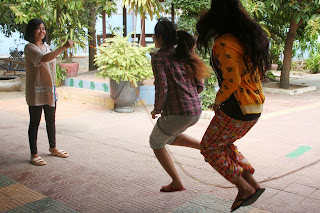As part of our #10yearsofChabDai series, we asked Esther Pastores of
World Hope International for her thoughts working in
relief and development in Cambodia on and off for more than twenty years. One of our member NGOs from the very beginning,
WHI Cambodia also celebrates a decade in the fight against human trafficking
and exploitation this year…
My initial experience working
with Cambodians was in 1987- 89: coordinating mother, child health and
community services in Site 2 South refugee camp, Thailand with Christian
Outreach Relief and Development (CORD). Following this I had the opportunity to
help establish primary health care programs in Kampot and Prey Veng from 1990-93, during the UNTAC era.
After a few adventures in other
countries I returned to Cambodia in 1998 as Country Director with CORD and
subsequently worked with Hagar Women’s Shelter as Operations Manager. I really came
to work with WHI by default, having initially agreed to evaluate the assessment
centre (AC) program, was then invited back to implement the 40 or so
recommendations for improving the work. And I’ve remained with WHI ever since!
What is your
motivation for working in the – often harrowing – field of human trafficking
aftercare and prevention?
Speaking personally my motivation essentially lies in
supporting my Cambodian colleagues, in whatever line of humanitarian work they
are engaged. Over the years it has been a privilege and a joy to walk alongside
and share in their learning. At the AC my
colleagues are the ones doing the real work of ministering to abused children –
they are the frontline folk dealing with issues and restoring broken lives; I’m
happy in the knowledge that by ensuring they are provided the best work
environment possible, through strong team relationships, learning
opportunities, adequate staff care, pastoral care (and benefits package), that
this will ultimately contribute to an effective ministry.
WHI and Chab Dai have very much ‘grown up’ together, both
organisations this year celebrating our respective 10 year anniversaries. At
one time our organisations shared a common office, as a result of which we developed
close relationships between staff and shared knowledge of each other’s programs
and priorities.
As Chab Dai, WHI believes strongly in the significance of partnership,
shared learning, pooled resources and all the other benefits of working
collaboratively – joining the Coalition was therefore a given for us.
How has Chab Dai
membership made a difference to WHI?
The list really is quite extensive – from the different forums
to the Charter project we wouldn’t have become the organisation we are today
without Chab Dai’s input. Personally I have found the various
research projects commissioned to be particularly helpful. One may often
have hunches about certain aspects of the work, but research really provides
the evidence needed for developing sound programs.
 What changes have you
seen – both on the ground and governmental – to do with the human trafficking
issue in Cambodia since 2005?
What changes have you
seen – both on the ground and governmental – to do with the human trafficking
issue in Cambodia since 2005?
Probably these are best summarised in the Journey
of Change documented by Chab Dai in 2013 – I would say a growing maturity
of organisational capacity, but also perhaps a waning emphasis on real
engagement between partners.
And what changes do
you hope to see in the next ten years?
Better education systems, especially for girls; more jobs
and opportunities, particularly in rural Cambodia, to lessen the need for
migration.
Thanks to Esther for
talking to us. If you want to know more about World Hope International and its
work, take a look at their website here.
Images provided by World Hope International.
Images provided by World Hope International.




No comments:
Post a Comment